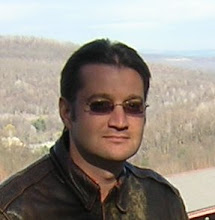Remember the now-legendary blogger interview of Senate President Mike Miller back in January? When we asked him about the computer tax, the Senate President answered, "The computer tax is not a good tax, but it’s $200 million and I’m going to fight to keep it... No one can agree on a replacement." And here’s our report on House Majority Leader Kumar Barve's comments:
"The House got rid of the computer sales tax but it came back. It’s bad public policy. It’s unwise to tax businesses that are mobile," Barve stated. "But unless we’re willing to find $200 million in extra revenues, it will be very difficult to get rid of." And why was the computer industry vulnerable? "In politics, when something unpleasant has to be done, it’s usually done to whoever squirms around the least!" Barve noted that Senator Rob Garagiola (D-15, MoCo) had a proposal to replace it with a gas tax, "but that is a non-starter." Added to Mike Miller’s comments, Barve’s opinion indicates that the computer tax is not going anywhere because there is no other way to raise the money.Mr. Miller’s and Mr. Barve’s political predictions have been proven correct. When the Republicans proposed spending cuts and tapping "unallocated funds" to pay for a repeal, the Senate rejected it. When Senate Democrats proposed an income tax surcharge on the rich, Montgomery County officials opposed it. Time is running out: the current session has less than a month left and the computer tax is due to take effect this summer.
The tragedy is that it didn’t have to be this way. Governor O’Malley never proposed this tax. The House of Delegates did not propose it. And there were other ways to raise the money. An extra point hike in the corporate income tax could have raised at least $100 million and Maryland’s rate would still have been lower than Pennsylvania and D.C., equal to New Jersey and barely higher than West Virginia and Delaware. Combined reporting on corporate income taxes could have raised $25 million. Progressive Maryland believes it could have been worth $100 million. The legislature could have kept the Governor’s original higher income tax rates on individuals making $150,000, raising perhaps tens of millions more. And the legislature could have aggressively gone after tax-cheating employers but so far has not done so.
Instead, we are left with a looming, devastating tax on a knowledge-based industry critical to the state’s future. Everyone hates it. But no one has figured out how to get rid of it. Surely the Democrats in Annapolis can do better than this.
Update: The Sun reports that a surtax on millionaires is gaining ground. Democratic Senator Verna Jones's (D44-Baltimore City) proposal would raise $230 million by instituting a surcharge rate of 6% on incomes between $750,000 and $1 million and 6.5% on incomes above $1 million. But Montgomery County Executive Ike Leggett has written in opposition to the plan.
Update 2: The Governor has come out in favor of replacing the computer tax with the surcharge. However, Democratic Senator Robert Zirkin (D11-Baltimore County) has proposed to repeal the computer tax if the slots referendum passes. He also favors cutting transportation projects.
Senator Zirkin, I know my Montgomery County delegation is split on taxing the wealthy. But I would hope that all of them would stick together on opposing transportation cuts. All they hear is how horrible traffic congestion is from both their constituents and our County Council. Good luck in getting our eight State Senators to cut State Highway and transit projects in our county.

